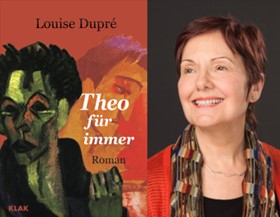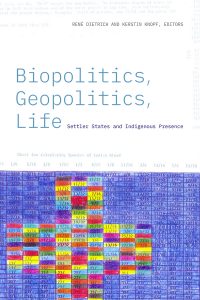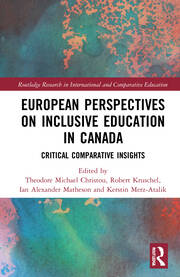Amokläufe und Massaker sind Ausdruck einer Welt, die droht, den Menschen in Verzweiflung zu stürzen. Die Filmcutterin Beatrice weiß dies nur zu gut. Gerade arbeitet sie an einem Dokumentarfilm zum Thema, als das Telefon läutet und nichts mehr ist wie zuvor. Ihr Stiefsohn, der 18-jährige Theo, intelligent und liebenswert, war seinem Vater nach Florida gefolgt und hatte versucht, ihn während eines Vortrags an der Universität zu erschießen. Ein Polizist griff ein und die Tragödie nahm ihren Lauf. Zwei Jahre später beginnt Beatrice, die Geschichte niederzuschreiben, um endlich zu verstehen, wie ein unbescholtener junger Mensch zum Gewalttäter werden kann. Wo beginnt das Böse? Wo endet die Normalität? Wo liegen Schuld und Verantwortung? Welche Rolle spielt die Familie, deren Wurzel nach Deutschland reicht? Erzähltechnisch brillant entblättert Louise Dupré das Geschehene für den Leser in einem kunstvollen Spiel.
„Diese Angst, hatte Theo sie gekannt? War er sich bewusst, nicht mehr er selbst zu sein, als er den Revolver in seinen Rucksack steckte, als er in den Hörsaal eindrang, als er auf seinen Vater zielte, mitten in den Bauch?“
„Wir waren nicht die Einzigen, das war mir völlig bewusst. Familiendramen sah man in den Staaten jeden Tag [..,]. Männer, die ihre Frauen töten, Kinder ihre Eltern, das war mir völlig bewusst, ja, ich sah fern, ich las die Zeitungen, […] aber dieses Wissen half mir nicht zu verstehen, es tröstete mich nicht.“
„Ich sammle eifrig alle nur möglichen positiven Zeichen, einen großen Frauenmarsch in den USA, Männer, die die Frauen unterstützen, Tausende von Menschen, die sich nicht beugen lassen. Ja, wir machen weiter.“
Theo für immer ist ein „Roman der Resilienz“, schreibt Louise Dupré, er zeigt, dass der Mensch zerbrechlich ist, aber auch über große Widerstandskräfte verfügt.
Die Übersetzerin:
Ursula Mathis-Moser, emeritierte Universitätsprofessorin für französische und spanische Literaturwissenschaft, Übersetzerin. Bis 2022 Leiterin des Zentrums für Kanadastudien der Universität Innsbruck. Ca. 300 Publikationen zur französischen und den frankophonen Literaturen (Québec, Karibik), darunter Mit-Hg. des Lexikons “Passages et ancrages en France. Dictionnaire des écrivains migrants de langue française” (1981-2011). Auszeichnungen u.a. Governor General’s Award 2019, Ordre des francophones d’Amérique 2012, Prix Jean Éthier-Blais de critique littéraire 2004 für eine Monographie über Dany Laferrière.
Für mehr Informationen : https://www.klakverlag.de/produkt/dupre-louise-theo-fuer-immer-roman/


 This volume aims to introduce undergraduates, graduates, and general readers to the diversity and richness of Canadian short story writing and to the narrative potential of short fiction in general. Addressing a wide spectrum of forms and themes, the book will familiarise readers with the development and cultural significance of Canadian short fiction from the early 19th century to the present. A strong focus will be on the rich reservoir of short fiction produced in the past four decades and the way in which it has responded to the anxieties and crises of our time. Drawing on current critical debates, each chapter will highlight the interrelations between Canadian short fiction and historical and socio-cultural developments. Case studies will zoom in on specific thematic or aesthetic issues in an exemplary manner. The Routledge Introduction to the Canadian Short Story will provide an accessible and comprehensive overview ideal for students and general readers interested in the multifaceted and thriving medium of the short story in Canada.
This volume aims to introduce undergraduates, graduates, and general readers to the diversity and richness of Canadian short story writing and to the narrative potential of short fiction in general. Addressing a wide spectrum of forms and themes, the book will familiarise readers with the development and cultural significance of Canadian short fiction from the early 19th century to the present. A strong focus will be on the rich reservoir of short fiction produced in the past four decades and the way in which it has responded to the anxieties and crises of our time. Drawing on current critical debates, each chapter will highlight the interrelations between Canadian short fiction and historical and socio-cultural developments. Case studies will zoom in on specific thematic or aesthetic issues in an exemplary manner. The Routledge Introduction to the Canadian Short Story will provide an accessible and comprehensive overview ideal for students and general readers interested in the multifaceted and thriving medium of the short story in Canada.
